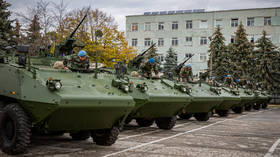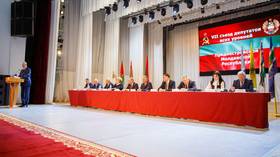NATO applicant suspends landmark arms control deal

Moldova suspended its participation in the Treaty on Conventional Armed Forces in Europe (CFE) on Wednesday. The decision now requires the backing of the country’s parliament and president before taking effect.
The CFE Treaty was signed in 1990 by the members of the Warsaw Pact and NATO in the last months of the Cold War. It imposed limits on the number of tanks, armored vehicles, artillery, attack helicopters, and warplanes stationed in Europe.
The cornerstone treaty, however, ended up in limbo before it actually entered into force in 1992, as the Soviet Union had collapsed by that time and the Warsaw pact was dissolved. An adapted version of the CFE was signed in 1999, basing the limitations on specific countries rather than blocs. However, the updated version was never ratified by any NATO states.
Moscow has condemned Moldova’s decision. The head of the State Duma’s defense committee, Andrey Kartapolov, claimed the move is ultimately aimed against Russia.
“In essence, this treaty has already lost its purpose, so it will not change anything, but the move itself is directed against the interests of our country, we will certainly keep this in mind,” the senior lawmaker told RIA Novosti.
Russia suspended its participation in the treaty in 2007, citing the failure of new NATO members to abide by the CFE’s restrictions. In 2015, Russia formally withdrew from the CFE, arguing that no members of the US-led bloc were adhering to the agreement.
Moscow’s withdrawal was finalized last May, when President Vladimir Putin signed a law terminating the treaty. At the time, Kremlin spokesman Dmitry Peskov said the decision would not have any “direct ramifications,” given that the CFE was already a “dead mechanism.”
NATO suspended its participation in the CFE in 2023, claiming the demise of the cornerstone agreement would only expand the bloc’s military capabilities.













